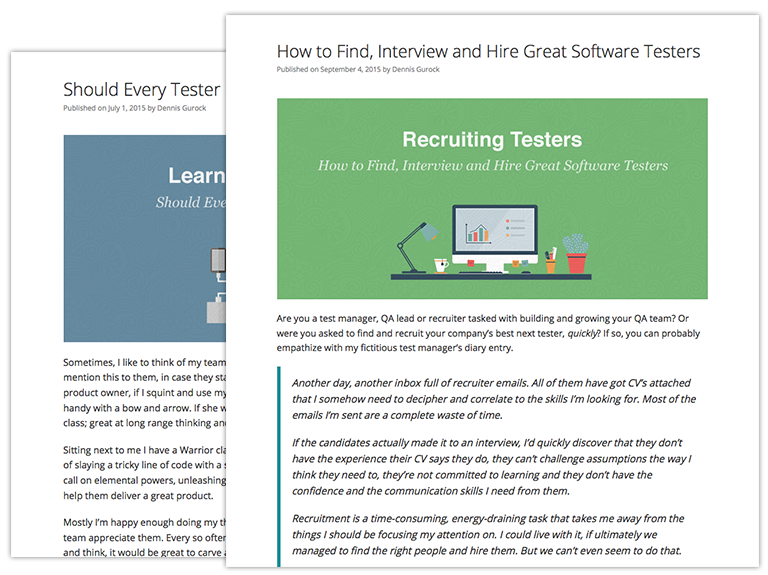Let’s face it. As much as companies talk about high-minded mission, values, and cultures, employment carries a natural “what’s in it for me” component. This isn’t to say that people don’t appreciate these considerations. It’s just that the consideration needs, realistically, to flow both ways. Everyone wants to grow and progress in their careers, earning their way to better situations. So, in a nod to that, I’m going to talk today about the software tester career path.
You may work for a great company, but it won’t be a great deal for you unless you understand your own path to growth.
When you initially take a gig as a software tester, your growth path may not be immediately obvious to you. So let’s go into detail about what it can look like.
The Road Not Taken: The Software Tester Career Path I’m Not Going to Cover

Before I dive into what your career path might look like, let me speak briefly to the possible paths I won’t cover.
Specifically, I’m not going to cover lateral transitions. As a software tester or QA pro, you’re in the trenches of software development. This gives you many opportunities to cross-pollinate your skillset and to learn other, related trades. You thus have a natural opportunity to transition into roles like the following.
- Software developer
- Project manager
- Scrum master
- Business analyst
You can absolutely carve out a career path that takes you from software tester to any one of these, and probably some others besides. But I’m not going to talk about that in this particular post, because transitioning out of testing software isn’t part of the software tester career path.
For the rest of the post, I’m going to assume that you’re where you want to be in terms of the nature of your work. The rest of the post follows how you grow as a software tester.
Getting a Foot in the Door

Before you can get started on any career path, you need to actually arrive at the beginning of that path, so to speak. If you want to follow the software tester career path, you need to get a foot in the door as a software tester.
The demand for software in the world is staggering. As a result, many unconventional paths exist to getting started with roles in the software industry when compared to other professions. So there is no one way to get a foot in the door. Here are some ways people start as software testers.
- Working another corporate role and transitioning into testing when the software group needs help with QA.
- Starting as a power user of a piece of software and being tapped to start testing it.
- Attending a Software QA bootcamp.
- Getting a software testing certification.
- Earning a CS degree and starting out in QA (I have a CS degree, and my first corporate job was as an SQA Engineer, for instance)
As you can see, there are many ways to get started, and I haven’t even exhaustively listed every option you have. So, if you’re on the outside looking in, keep your eyes open, work on your skillset, and you’ll find an opportunity.
The Entry Level: Executing Tests

Once you get that opportunity, you’ll start out doing some fairly predictable work. As an entry-level tester, you’re going to be, well, executing tests. And I emphasize the executing part.
A hallmark of this stage in your career is that you’ll tend to follow a script. People with more experience in your organization’s domain will design the software, speak for the users, and agree on how the software should behave. And people with more experience in testing software will likely design the testing strategy and test cases.
Then they’ll hand them to you to execute, and you will follow that script.
This won’t be the most creative work that you’ll ever do, but it’s important. It gives you a chance to learn about test case management. Specifically, keep your eyes open to learn what it means to have a portfolio of tests, how you record results, how you roll them up and report on them, and how you keep the whole thing organized. This is non-trivial and it’s important.
Experienced Testers: Test Design and Testing Strategy

As you gain experience both executing the tests and using the tools at your disposal, you’ll naturally find yourself in the “experienced tester” camp after a while. You’ll learn about your company’s software, your domain in general, and your testing strategy.
Make sure you leverage this learning.
But don’t just leverage it in a vacuum. You want to be moving toward participation in the test case design and overall testing strategy. Make it your goal to get yourself not only a seat at the table when setting out the testing plan, but even when discussing the merits of new features of the software and user experience. After all, you’re becoming well versed in the software and its use.
Once you start participating in these more strategic goals, you’ll find your role expanding, your pay increases, and your title becoming more reflective of both realities.
Veteran Testers: Test Automation and Efficiency

As you really come into your own in the testing world, you’ll start to look beyond test case execution and even, to an extent, beyond testing strategy. You’ll start to want to think about the company, your group, and your efficiency.
What I mean is that you’re going to start asking yourself not just “what should we test,” but “how can we test that more quickly and less expensively?” Enter test automation. You should start to learn your way around tools that improve test suite management and tools that automate the execution of tests.
It’s no secret that the line between development and testing is a blurry one. Embrace that blur. You don’t need to aspire to a software engineering role to take advantage of automation. Strategic automation will make you a better tester and pull you toward roles with descriptions like “senior” in the title.
Join 34,000 subscribers and receive carefully researched and popular article on software testing and QA. Top resources on becoming a better tester, learning new tools and building a team.

Influential Testers: Domain Expertise and Thought Leadership

By this point, you’ve well-established yourself as a consummate QA pro. You’ve been at this for a number of years, and you’ve learned the ins and outs of test execution, test strategy, and optimizing for efficiency. This already makes you a valuable asset to any organization.
The next logical step is one where you start to move into a thought leadership role. This might be within your organization, being an active participant in important product management discussions. Or it might be in your organization’s domain, attending trade shows or conferences. Or, perhaps it’s in the realm of software testing as a profession, where you’ve become an expert in something like load testing or penetration testing.
Whatever the case may be, this is the stage where you’re establishing a niche for yourself and are starting to demonstrate a unique value proposition for yourself. And if you haven’t started thinking in these terms yet, despite being in the field for a while, I encourage you to do so.
Formal Organizational Leadership

I’ll conclude with the obvious “last stop” on the software tester career path: formal organizational leadership. Of course, there’s a difference between being the QA manager and the organization’s CIO. But once you’re talking about that difference, you’re talking about the management career path, rather than the software tester career path.
I should also mention that you may have no interest in going into management, which is perfectly fine. But that doesn’t alter the fact that the world generally views management as a step beyond individual contributor status when talking about career paths.
Interestingly, if you’ve followed the career path I’ve outlined here, this will be your easiest and most natural step. Once you’ve mastered executing tests, managing tests suites, optimizing the whole thing for efficiency, and doing it all from an influential position of authority inside and outside of your organization, you will find that opportunities for leadership come to you. And then you can take them or not, as you see fit. Want more software testing career tips? Check out this post on 6 ways to grow your software testing career!



